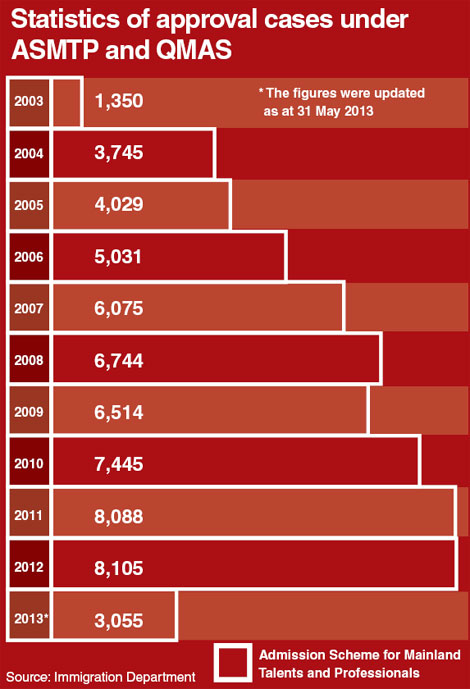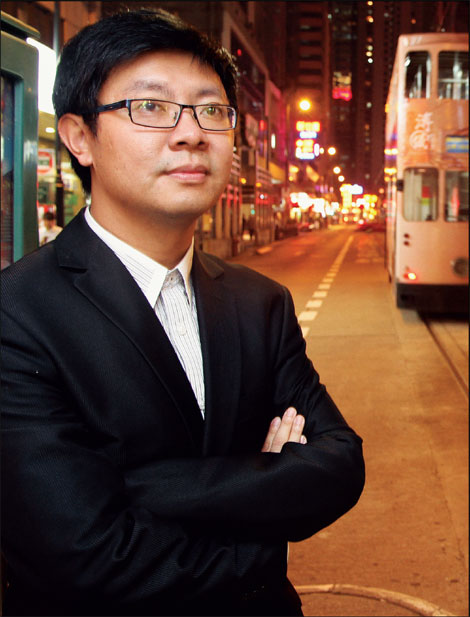Young guns from up north
Updated: 2013-06-28 07:40
By Andrea Deng(HK Edition)
|
|||||||


The HKSAR remains a magnet for global talents 16 years after the handover. Most of the top professionals in various industries are from the mainland, posing an enormous challenge to local job seekers. Andrea Deng reports.
The young mainlanders who squeeze into the ranks of Hong Kong's top-tier professionals are gritty survivors.
They struggle with Cantonese, with English, with finding their place in the local community - all of this amid a clutter of world-class talents just as avid as the mainlanders to be named to the top jobs. The economy here is buttressed on a tradition of efficiency and high quality service, and successful job applicants will be called upon to deliver on the city's collective promise to clients.
Probably, it would have been a lot easier for these young mainlanders to find jobs back home where their connections are located. Time goes by and the mainland "expats" watch their friends give up on Hong Kong and head for the green, green grass of home where it's easier to find jobs, living costs are lower and there's not as much stress. Those mainlanders who remain try to shake off their doubts and redouble their efforts to try to squeeze into the city's "elite."
Kevin Zhang turns 30 next month. He's one of the mainlanders who have made it. He fought hard for his position because he was motivated - almost as a calling -- to remain here.
"I feel a passion for finance and tax-related jobs. I was clear about this a long time ago, and since Hong Kong is Asia's financial center, I decided I must come here," says Zhang.
Zhang is the kind of focused, rational, sanguine kind of guy, who is driven by an inner ambition that captivated him long ago.
His family in northern China is neither well-to-do nor well-connected. Zhang worked hard and became one of the top achievers when he was in middle school. Immediately after high school graduation, came the offer - which he clasped avidly - to attend the University of Western Ontario, a school with one of the leading programs in economics and finance. He took a job at a coffee shop, part time, so he could improve his English - talking to the customers at every opportunity.
After completing four years of undergraduate studies in Canada, Zhang pursued his Master's degree at the Hong Kong University of Science and Technology - another school with an established reputation in the fields of economics and finance.
The policy that we have today - to smooth the way for mainland graduates to stay in Hong Kong to look for work - didn't exist when Zhang was doing his post-graduate studies.
"It was difficult for mainlanders to find jobs in Hong Kong. They could barely speak Cantonese and weren't very fluent in English for that matter. Working visas were a problem. A lot of my friends went back to the mainland," Zhang says.
But, he never stopped working hard, and became a member of the Association of Chartered Certified Accountants and Certified Public Accountant, apart from pursuing the title of chartered financial analyst. These helped. He forced himself to gain proficiency in Cantonese, since many Hong Kong colleagues could not or are unwilling to speak Mandarin.
He spent six years with one of "The Big Four," working on tax planning with clients from not just Greater China but other countries from around the world. The pressure, he described as excruciating. Many of his peers quit.
"Not that I didn't feel the pressure. But I'm not overwhelmed by pressure. I could handle it. I feel lucky because I'm really interested in the job and feel proud when I solve a problem - and that what I'm doing is meaningful when I help clients save money in a legal way," Zhang stresses.
He moved on from his first job - deciding the learning curve there had gone flat. The new job entails more responsibility. He is now an associate director of a taxation planning team at a major investment bank in Hong Kong. And he is dealing with tax-related matters from all jurisdictions around the world.
This job is even more demanding but he loves it - saying he's excited to learn new things and explore them every day. Sometimes, he feels obliged to spend a few hours a day just to do research on tax laws of other jurisdictions, or check through old company files before taking action.
"Hong Kong has so many competitive talents. In the job market, people do not judge you by where you're from, even though living in Hong Kong I do sometimes feel there's discrimination. Information is updated so quickly and I have to read the news every day to stay informed," he said.
"I hate to say I'm successful. But I can see my own progress in the past years. I did everything step by step, feet on the ground. There's still a long way to go," says Zhang, who has just gotten married and soon will become a permanent Hong Kong resident.
New blood
The world has changed. Hong Kong is still doing OK, attracting top level mainland talent to meet a shifting market.
There are plenty of people like Zhang, elite, young mainland professionals, ready to take up the challenge to handle demanding jobs and earn better rewards. They have a good mix of mainland knowledge, a tad of the Western education that recruiters are seeking with growing frequency. Young mainlanders also are changing the foundation of the city's human capital.
At present, an estimated 500,000 mainlanders are either engaged in high-level studies or working in Hong Kong after graduation from a local university. It must not be forgotten however, that in addition, thousands more mainland professionals with superior qualifications who have not attended local universities, continue to arrive every year.
They come under the aegis of the Admission Scheme for Mainland Talents and Professionals. As of May 2013, 60,180 mainland talents had been admitted to work in Hong Kong through the scheme, according to the Immigration Department.
This was a huge difference from 10 years ago. Between 2001 and 2002, only 268 mainland professionals were admitted to the city.
The aim of the scheme is to attract professionals whose skills are needed to keep the city's economic development flourishing, but which are not "readily available" locally. The principle was pretty much in line with 10 years ago when Western talents were most welcomed in Hong Kong.
Government records show that, currently, about 29 percent of those admitted under the scheme have gone into the research and education sectors. Another 20 percent entered the arts and culture streams. About 12 percent chose finance and about 13 percent took up business and trading.
"Mainland talents help to extend sustainability for Hong Kong's continuing development. They are not here because they're from the mainland. They're here because they possess the merits that might be better than others and needed in the city," says associate professor Mo Pak-hung of the Department of Economics at Hong Kong Baptist University.
"Hong Kong will continue to need mainland talents in many industries increasingly involved in cross-border and cross-industry activities," he adds.
Joshua Mok Ka-ho, acting vice-president of the Hong Kong Institute of Education, observed that Hong Kong is just like every other "global city" vying for the best talents from around the world.
"As long as these talents are what Hong Kong needs, it's a good thing, whether they are from the mainland or not," says Mok, who lists Greater China studies among his fields of expertise.
David O'Rear, chief economist with the Hong Kong General Chamber of Commerce, wrote in a recent commentary that Hong Kong's key competitors - London and New York - are able to "draw on the best and brightest from a labor pool many times larger than their city populations." Hong Kong, however, has restricted itself in this respect.
"For the vast majority of work that needs to be done in a global business and financial center, locally-born and educated talent is insufficient," O'Rear wrote.
Meanwhile, when we look at the picture through the other end of the telescope, the number of Hong Kong talents journeying north is also growing, as Hong Kong professionals and graduates are hot prospects on the mainland - their international knowledge and professionalism fit the skill set many mainland companies demand.
Statistics show that in 2012 alone, there were about 400,000 Hong Kong people residing in Beijing, Shanghai and Guangzhou. Mainland talents coming to Hong Kong might in some way help to staunch that very evident brain drain leaving Hong Kong, many of whom become managers on the mainland.
Zhang, who is familiar with Canada's lifestyle after four years of study and hard work in that country, has become familiar with the bits and bops in Hong Kong. But, he's still trying to pick up more Cantonese slangs. But he already finds himself a part of Hong Kong, which he wants to pay back to.
The Hong Kong New Youth Association which he founded a few years ago and now has about 600 official members and more than 1500 non-official members, mainly mainland graduates in Hong Kong, often organizes volunteers work, helping the low-income people and visiting elders.
"I have always been able to adapt to the environment," Zhang says.
Contact the writer at andrea@chinadailyhk.com
|
Kevin Zhang is one of the gritty survivors from the Chinese mainland, who worked very hard in order to meet the high level of requirement in Hong Kong's competitive job market. Parker Zheng / China Daily |

(HK Edition 06/28/2013 page8)
